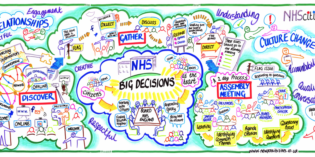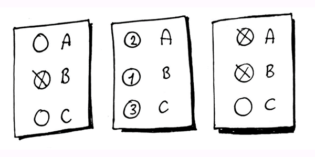Informing and engaging citizens

Who wastes their vote?
In their recent study, Corinna Kroeber, Cal Le Gall and Sarah C. Dingler analyse the similarities and differences of voters who do not make their vote count by voting for a party or candidate unlikely to win an election. Studying voting behaviour in three European democracies with different majoritarian electoral systems, namely the United Kingdom, Germany and France, they show that the archetypical ‘ballot wasters’ are the young and men.

NHS Citizen and what it tells us about designing democratic innovations as deliberative systems
Rikki Dean, John Boswell and Graham Smith analyse an attempt to design a systems-oriented democratic innovation: the NHS Citizen initiative. They write that, while the initiative pioneered some cutting-edge participatory design, it failed to resolve well-known obstacles to institutionalisation. They argue that similar projects must evolve strategies to meet such challenges.

Referendums can be more effective if voters can choose from several options
As the UK prepares for a second general election since the 2016 Brexit referendum, Charlotte C.L. Wagenaar demonstrates how a multi-option referendum could be a valuable tool in future to gauge more nuanced public attitudes on divisive issues. By presenting several alternatives, they can encourage votes for constructive compromises rather than blunt protest votes.

Requiring voter ID in British elections suggests the government is adopting US ‘voter suppression’ tactics
This week’s Queen’s Speech revived proposals to introduce photographic ID requirements for voting in British elections. The Democratic Audit team assess the available evidence on the likely consequence of such a measure, and consider whether the legislation tackles the right priorities for improving our elections on which there is consensus, or suggests moves to enhance Tory election chances via excluding voters presumed unfavourable to them.

Have we all underestimated the severity of socioeconomic differences in electoral participation?
Opinion polls routinely overestimate voter turnout, since participants misreport their own voting record, and because politically engaged voters are also more likely to respond to surveys. Using unique linked survey and register-based data from Finland that allows them to measure the effects of these biases, Hannu Lahtinen, Pekka Martikainen, Mikko Mattila, Hanna Wass, and Lauri Rapeli demonstrate that these two factors also lead to an underestimation of socioeconomic differences in turnout. The results imply that social inequality in political participation is a greater social challenge than previously thought.

When select committees speak, do newspapers listen?
It is frequently claimed that the House of Commons’ select committees have grown in prominence since key reforms were implemented in 2010. Brian J. Gaines, Mark Goodwin, Stephen Holden Bates and Gisela Sin test this claim specifically in relation to press coverage. They find a pattern of increased newspaper attention after the reforms, but caution that these results show no consistent sustained increase, and also vary considerably depending on committee.

Press freedom is necessary to advance environmental protections across the globe
Journalists face increasing threats and obstacles to investigating environmental conditions internationally. In new research, Jeff Ollerton, Matt Walsh and Ted Sullivan find that press freedom goes hand in hand with a higher level of environmental protection. Therefore, for countries to address the climate crisis, they need an open, well-resourced media.





 Democratic Audit's core funding is provided by the Joseph Rowntree Charitable Trust. Additional funding is provided by the London School of Economics.
Democratic Audit's core funding is provided by the Joseph Rowntree Charitable Trust. Additional funding is provided by the London School of Economics.